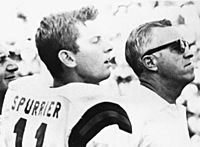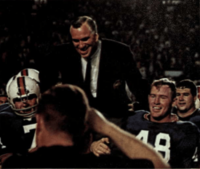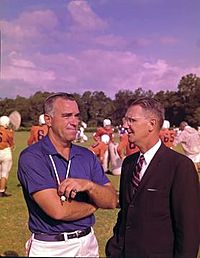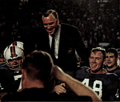Ray Graves facts for kids
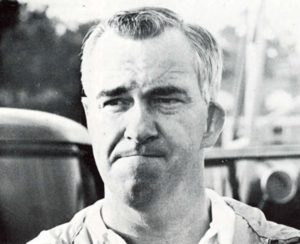
Graves in 1965 Seminole yearbook
|
|
| Biographical details | |
|---|---|
| Born | December 31, 1918 Knoxville, Tennessee, U.S. |
| Died | April 10, 2015 (aged 96) Clearwater, Florida, U.S. |
| Playing career | |
| 1939–1941 | Tennessee |
| 1942 | Philadelphia Eagles |
| 1943 | Phil./Pitt. Steagles |
| 1946 | Philadelphia Eagles |
| Position(s) | Center / Linebacker |
| Coaching career (HC unless noted) | |
| 1944–1945 | Tennessee (line) |
| 1946–1950 | Philadelphia Eagles (line coach / scout) |
| 1951–1959 | Georgia Tech (assistant) |
| 1960–1969 | Florida |
| Administrative career (AD unless noted) | |
| 1960–1979 | Florida |
| Head coaching record | |
| Overall | 70–31–4 |
| Bowls | 4–1 |
| Accomplishments and honors | |
| Awards | |
| SEC Coach of the Year (1960) University of Florida Athletic Hall of Fame Florida–Georgia Hall of Fame |
|
| College Football Hall of Fame Inducted in 1990 (profile) |
|
Samuel Ray Graves (born December 31, 1918 – died April 10, 2015) was an American football player and coach. He was born in Tennessee and went to the University of Tennessee. There, he was a starting center and team captain for the Volunteers.
After playing in the National Football League for three seasons, he became an assistant coach. He coached at Tennessee and then at Georgia Tech. From 1960 to 1969, he was the head football coach at the University of Florida. He led the Gators to their most successful time ever back then. He also coached Heisman Trophy winner Steve Spurrier. Graves was also Florida's athletic director from 1960 until he retired in 1979.
Contents
Early Life and Education
Ray Graves was born in Knoxville, Tennessee, on December 31, 1918. His father was a Methodist minister. Because of his father's job, the Graves family moved often. They lived in different towns in eastern Tennessee.
In high school, Ray realized that playing sports could help him go to college. He worked hard in both football and school. He attended Central High School in Dayton, Tennessee.
Graves married Opal Richardson on November 3, 1942. They had three daughters together.
Playing Football
College Football Career
After high school, Graves received a scholarship to Tennessee Wesleyan Junior College. This was a small college in Athens, Tennessee. He studied there for a year.
Then, he got a scholarship offer from Duke University. But before he enrolled, Tennessee offered him a scholarship. He chose to stay in his home state and play for the Volunteers.
Graves played on the offensive line and as a linebacker. In 1939, his team had a perfect season. They were undefeated and no other team scored against them. They were invited to play in the Rose Bowl.
He was the starting center and team captain in his senior year, 1941. He was named one of the best players in the Southeastern Conference (SEC). Graves later said his coach, Robert Neyland, taught him a lot. Neyland made all players learn every position. This helped Graves understand the game better and become a great coach.
Professional Football Career
After college in 1942, Graves tried to join the United States Navy. But he couldn't because he had a hearing problem. He was not allowed to serve in the military.
The Philadelphia Eagles picked Graves in the 1942 NFL Draft. He stopped coaching high school football to play professionally. He played for the Eagles in 1942 and 1943. In 1943, the Eagles and Pittsburgh Steelers joined together temporarily. This team was called the "Steagles" because of player shortages during World War II.
Graves left the Eagles to be an assistant coach at Tennessee in 1944 and 1945. He returned to the Eagles in 1946 as a coach and scout. That year, many Eagles players got hurt. So, Graves played in seven games again. In total, he played in 28 professional games.
Coaching Career
Assistant Coach Roles
Coaching at Tennessee
In 1943, Graves thought about coaching the offensive line at Tennessee. But the school did not have a football team that year because of World War II. So, he kept playing pro football. After two seasons in the NFL, Graves went back to Knoxville. He became the Volunteers' line coach in 1944.
In 1946, Graves returned to the Eagles. He worked as a scout and assistant line coach. He even played again for a short time because of player injuries.
Coaching at Georgia Tech
Graves went back to college coaching at Georgia Tech. He was a defensive assistant coach under Bobby Dodd. With Graves and offensive coach Frank Broyles, the Yellow Jackets won championships in 1951 and 1952. They also won the 1951 Orange Bowl and the 1952 Sugar Bowl. In 1952, they were even named national champions.
Graves is known for creating the "monster defense." This was a new way to arrange players in the defensive backfield. He learned a lot from Coach Dodd. Dodd taught him how to build good relationships with players. This helped the team play their best.
Head Coach and Athletic Director
Leading the Florida Gators
In 1960, Ray Graves became the head football coach at the University of Florida. He coached the Gators for ten years, from 1960 to 1969. Graves led Florida to play in five bowl games. He coached many amazing players. These included Heisman Trophy winner Steve Spurrier and future NFL star Jack Youngblood.
One big moment was in 1963. Graves's team beat the powerful Alabama Crimson Tide 10–6. This was a big upset victory.
Graves also helped with the creation of Gatorade. In 1965, he let Dr. Robert Cade study his players. This research led to the invention of Gatorade. Graves saw how well it worked in a practice game. He asked Dr. Cade to make enough for the whole team. In their next game, the Gators played in very hot weather. The other team, Louisiana State, got tired. But the Gators, drinking Gatorade, came back to win. Graves told his friend, Hank Stram, about the drink. This helped Gatorade become the official sports drink of the NFL.
Graves's best coaching season was his last. In 1969, his Gators had a great record of 9 wins, 1 loss, and 1 tie. They beat the Tennessee Volunteers in the Gator Bowl. The team was ranked fourteenth in the country.
Graves's record at Florida was 70 wins, 31 losses, and 4 ties. He stepped down as coach in 1969. His former player, Steve Spurrier, later broke his record for most wins.
Graves's teams were also known for their academic success. A high number of his players, 93 percent, graduated from college. More than half of those graduates went on to become lawyers or doctors. His "Silver Sixties" Gators stayed close. They had a reunion with their coach every year until 2014.
After coaching, Graves stayed as the university's athletic director until 1979. He had held this job since 1960. As athletic director, he helped women's sports grow at Florida. He supported funding for women's athletics. Under his leadership, Florida's women's sports became one of the best programs in Division I. After retiring in 1979, he worked for another year helping with fundraising.
Graves received many honors. He was inducted into the Florida Sports Hall of Fame in 1972. He also joined the University of Florida Athletic Hall of Fame in 1981. In 1990, he was inducted into both the Tennessee Sports Hall of Fame and the College Football Hall of Fame. When Steve Spurrier became the Gators' coach in 1990, he created the Ray Graves Trophy. This award is given yearly to the team's most valuable player. The athletic office at the University of Florida's Ben Hill Griffin Stadium was named after Graves in 2005.
Later Life
After retiring from the University of Florida in 1980, Graves worked for a company in Tampa, Florida. He also advised a football team called the Jacksonville Bulls. Graves fully retired in 1989. He continued to live in Tampa with his wife, Opal. He passed away in Clearwater, Florida, on April 10, 2015, at 96 years old.
Coaching Record Summary
| Year | Team | Overall | Conference | Standing | Bowl/playoffs | Coaches# | AP° | ||
|---|---|---|---|---|---|---|---|---|---|
| Florida Gators (Southeastern Conference) (1960–1969) | |||||||||
| Florida: | 70–31–4 | 38–19–3 | |||||||
| Total: | 70–31–4 | ||||||||
|
|||||||||
Images for kids
See Also
- List of College Football Hall of Fame inductees (coaches)
- List of University of Tennessee people
 | James B. Knighten |
 | Azellia White |
 | Willa Brown |


